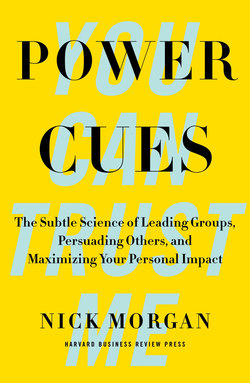Читать книгу Power Cues - Nick Morgan - Страница 24
На сайте Литреса книга снята с продажи.
What the Research Says about Your Hands: They’re Smarter Than You Think
ОглавлениеLet’s go a little deeper into the language and meaning of gesture and its use. You need to know what’s really at stake. And it will surprise you.
Psychologist Susan Goldin-Meadow kept noticing something strange.10 One of the prime tests psychologists use to determine how advanced a child is in her development is what is known as the “conservation test.” This test has a child pour liquid from a tall, skinny glass into a squat, fat glass. Now, because the second glass is shorter in height, very young children will tell you that there is less water once they’ve poured it into the second glass.
But once a child reaches a certain point in her development, she realizes that the liquid is conserved—that it’s the same amount. That’s conservation, and it’s an important breakthrough in everyone’s development, as a child growing up.
Goldin-Meadow noticed that when you asked children to explain their rationale for figuring out whether the liquid is conserved or not, they gestured a lot. In fact, sometimes they gestured things that they didn’t say. Kids who understood the concept might, for example, flip their hands back and forth to indicate that the two amounts of water were the same. Some of the kids who couldn’t yet verbally explain the idea would also make that flipping gesture, as if their hands knew something their brains didn’t.
This was surprising, because the dominant view about gesture until pioneers like Goldin-Meadow taught us differently was that gesture was a meaningless accompaniment to speech, which was really the important stuff.
